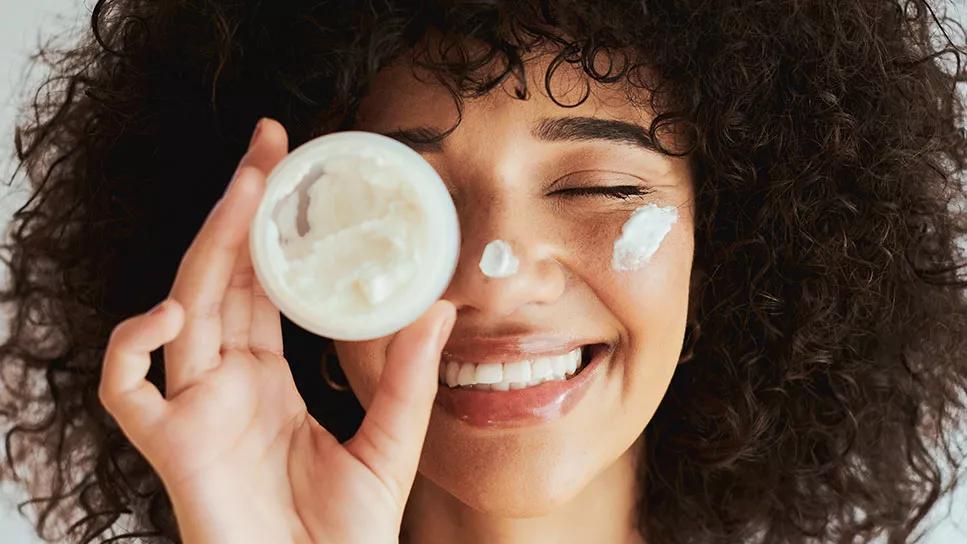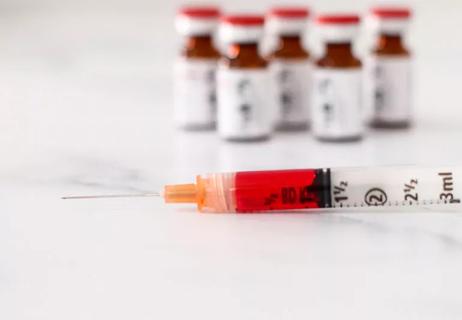Pantothenol is a powerful moisturizer and can help repair damaged skin and hair

If you have dry skin or damaged, brittle hair, you know the temptation. The one that makes you want to scoop up everything on the shelf that claims to moisturize, hydrate and revitalize.
Advertisement
Cleveland Clinic is a non-profit academic medical center. Advertising on our site helps support our mission. We do not endorse non-Cleveland Clinic products or services. Policy
So, when you see products that boast pantothenol, or vitamin B5, as a cure for your dryness, your first instinct is to give them a try. (Seriously, they’ve got to be more effective than banana peels on your face, right?)
What does panthenol do for your hair and skin, really?
“Pantothenol is a provitamin. When it’s used topically, such as in hair care or skin care products, it’s converted in your body to vitamin B5 also known as pantothenic acid,” explains dermatology resident Taylor Bullock, MD. “Pantothenol is a common ingredient in skin care and hair products I recommend, particularly for people who are prone to dryness.”
Dr. Bullock shares some of the benefits of vitamin B5 in your hair and skin care routines. What does it do? And just how helpful is it?
Pantothenol is a popular ingredient in lots of skin care and hair products. You’ll find it in skin care serums, moisturizers, scalp treatments, styling products and shampoos, usually right alongside words like “repairing,” “hydrating” and “renewing.” It’s also common in products used for diaper rash, after-sun care and more.
“Our skin and hair take a lot of beating — they’re exposed to the environment all the time,” Dr. Bullock notes. “Pantothenol can help protect your skin and hair from the elements and boost our bodies’ natural repair processes.”
Advertisement
Let’s talk about the benefits of vitamin B5 for your skin and hair.
When it comes to hydrating your skin and hair, there are three classes of ingredients to look for: humectants, emollients and occlusives.
Pantothenol is a two-in-one kind of moisturizing agent. It acts as both a humectant and emollient.
What does that mean for your skin and hair?
As a humectant, pantothenol helps draw water up from lower levels of your skin to hydrate your top layer (called your epidermis). Humectants also help you shed dead skin and hair cells, making room for fresh, shiny new cells. And they can use water from the air to moisturize your skin and hair.
Other popular humectants in your skin care include things like hyaluronic acid, lactic acid and sorbitol. Hair products intended for dry or damaged hair typically also contain humectants. Popular ones include glycerin, propylene glycol and phytantriol.
But pantothenol is also an emollient. Which means that in addition to using water from deep in your skin and in the air to provide hydration, it also fills in dry patches, which can smooth and soften your skin and hair.
“Humectants and emollients are an important part of moisturizing dry skin and hair, but they typically work best when paired with other hydrating agents, namely occlusives,” Dr. Bullock says. “For best results, you want your products to contain ingredients from all three categories: humectants, emollients and occlusives.”
Occlusives help prevent moisture loss. Helpful occlusives to look for in your hair care and skin care products include:
Pantothenol helps add strength to brittle hair. It can also help restore and smooth a damaged skin barrier.
How?
Picture your skin barrier or a strand of hair as a road. Over time, things like brushing your hair and over-exfoliating your skin can leave some “potholes” in your hair follicles and skin barrier. Pantothenol acts like a patch that can help fill in those potholes. That creates a smoother surface and adds stability to areas of damage.
“Your skin barrier is the outermost layer of your skin. It works to protect the more vulnerable skin cells underneath,” Dr. Bullock explains. “Aging, cold temperatures, allergens, sun exposure and more can damage that barrier, and lead to dry, rough skin.”
Likewise, brushing, drying and styling your hair can cause damage and breakage. Pantothenol binds to your hair shaft and your skin cells to smooth out the imperfections.
If long, luscious locks are your goal, pantothenol may help. Many hair care products that include vitamin B5 suggest they’ll help you grow “thicker, longer hair.” And they just might.
Advertisement
A 2021 research study says that pantothenol may help encourage longer, fuller hair by preventing cellular aging and death. That means less hair loss and a thicker mane.
But for all its potential, pantothenol isn’t exactly a magic elixir for hair loss.
“There’s evidence to suggest that pantothenol may help some people with thinning hair, and it might be worth a try, but it’s probably not going to be as effective as other treatments for hair loss,” Dr. Bullock points out.
If you’re looking for fuller healthier-looking hair, but not necessarily experiencing major hair loss, hair care products that include pantothenol may do the trick.
Research shows that pantothenol is a safe addition to just about any hair or skin care routine. It’s been classified as “generally regarded as safe” (GRAS status) by the U.S. Food and Drug Administration (FDA).
Pantothenol combines well with other ingredients, so you may be surprised to see it already listed as an ingredient in your routine, without having to search it out.
“For most people, I typically don’t recommend pantothenol as a standalone step in their routines because it’s already part of so many other products,” Dr. Bullock says. “Instead, I’d recommend seeking out products that contain pantothenol as part of an overall routine to combat dry hair and skin.”
Advertisement
In other words, you can probably skip the single-ingredient formulas that are straight-up vitamin B5 in a bottle. No need to add extra steps to your routine here. Instead, look for products that contain pantothenol as just one ingredient as part of a hydrating and strengthening formulation.
Overwhelmed by the options out there to moisturize and nourish brittle hair and dry skin? You’re not alone.
Try talking with a healthcare provider, like a dermatologist, to find the best ingredients and products for your goals. They can help you choose products that work for you, without breaking the bank or creating an unnecessarily complex self-care routine.
Advertisement

Sign up for our Health Essentials emails for expert guidance on nutrition, fitness, sleep, skin care and more.
Learn more about our editorial process.
Advertisement

The popular skin care ingredient can help smooth, brighten and strengthen your skin

Though it was once used as a cholesterol-lowering medication, niacin is no longer a recommended treatment

Some protein-containing foods are known to be good sources of biotin — but there are also likely other foods that just haven’t been studied yet

This essential nutrient helps convert food into energy, but don’t expect wonders for your nails and hair

This important B vitamin has benefits for your heart, brain and skin

Taking supplements with biotin can cause inaccurate lab test results

If you have low B12 or a true deficiency, these shots can work wonders

Getting enough thiamine in your diet can protect your heart, brain and nervous system

Even small moments of time outdoors can help reduce stress, boost mood and restore a sense of calm

A correct prescription helps your eyes see clearly — but as natural changes occur, you may need stronger or different eyeglasses

Both are medical emergencies, but they are very distinct events with different causes